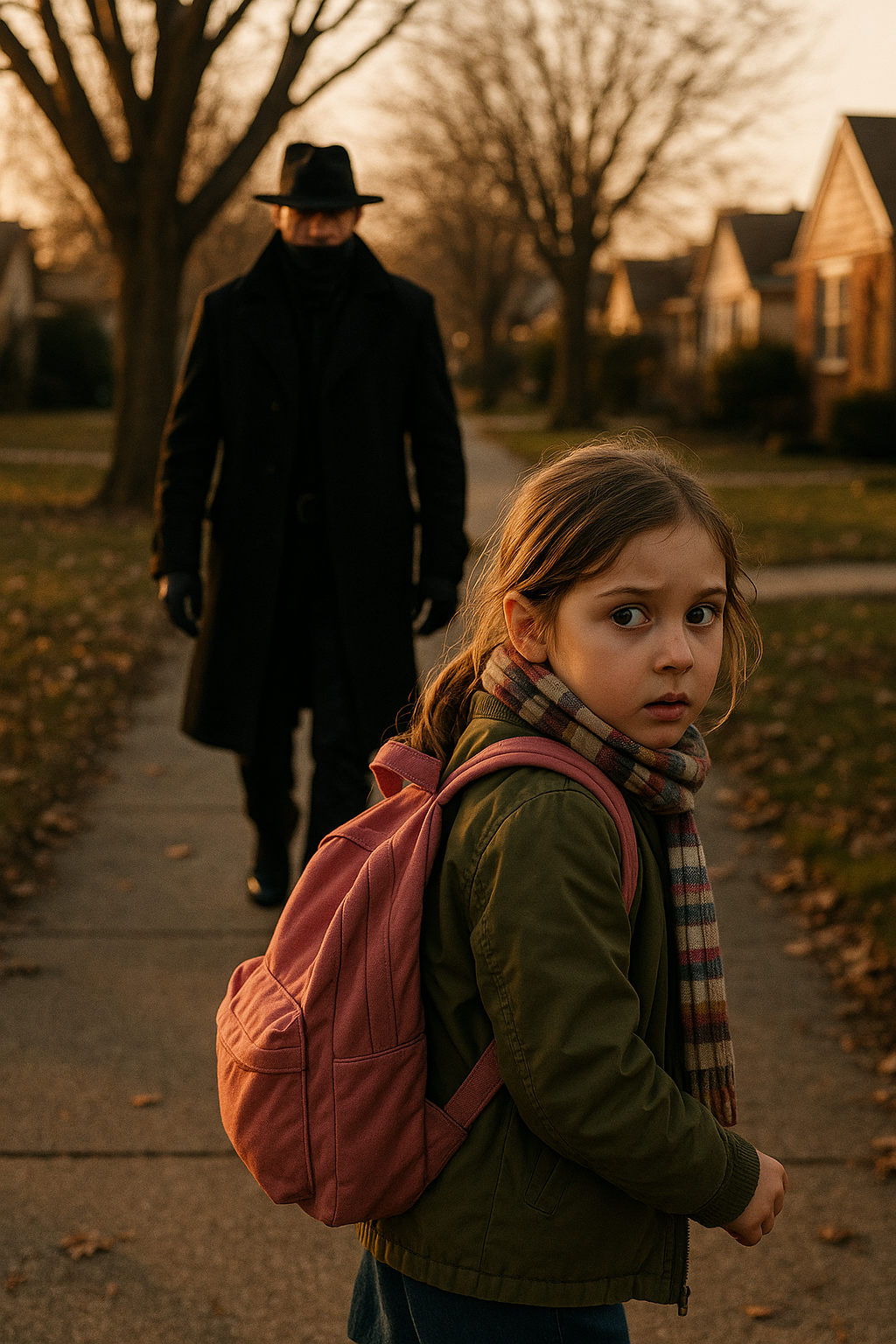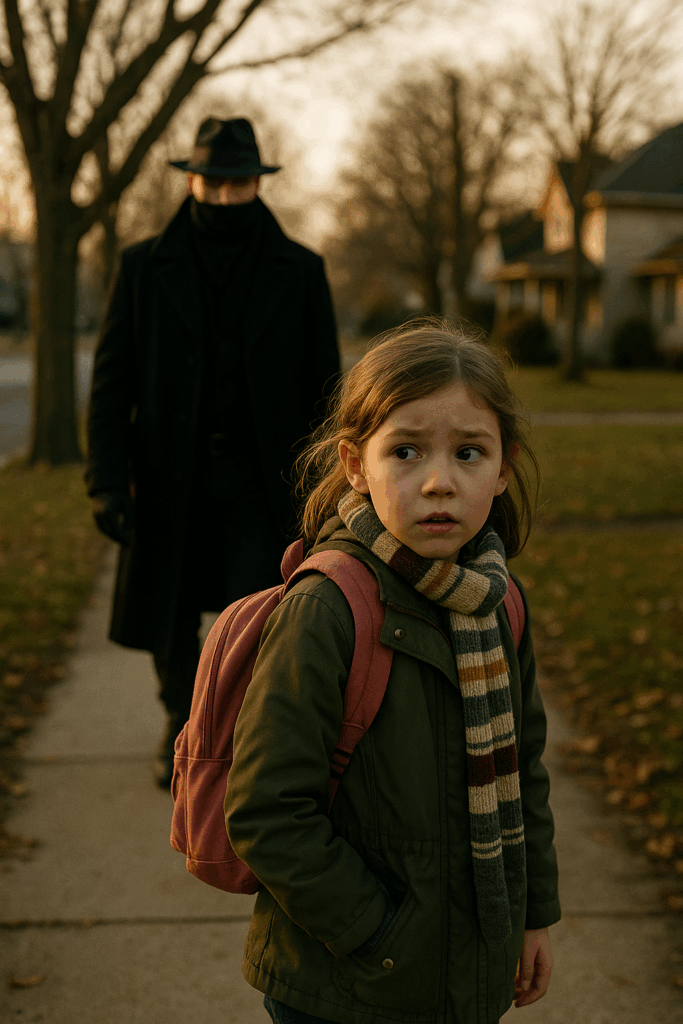It was supposed to be an ordinary Tuesday. Seven-year-old Mia Caldwell was walking home from school, humming the theme from her favorite cartoon and counting the cracks in the sidewalk like she always did. Her purple backpack bounced behind her, one shoelace untied, and her scarf dragging dangerously close to the pavement.
Her dad, Jack, usually met her halfway down Birch Lane, but today, he’d texted her teacher that he’d be late.
So Mia walked alone.
The wind carried the smell of rain. Birds had gone quiet. Even the usual hum of traffic from the nearby main road seemed distant, muffled — like the world was holding its breath.
Then, as she turned the corner, she saw him.
A tall man, dressed completely in black — gloves, coat, cap — standing at the end of the street. He wasn’t doing anything. Not moving. Not speaking. Just standing there, watching.
Mia froze.
Her small fingers tightened around her backpack strap, and her chest started to feel tight — the way it did before she cried. But then she remembered what her dad always told her before leaving for school:
“If something feels wrong, pumpkin, don’t hide from it. Don’t freeze. Find the light, find the people, and shout if you have to.”
She swallowed hard.
The man tilted his head slightly, as if he could hear her thoughts. Then, he started walking. Slowly. Toward her.
Mia’s first instinct was to run — but run where? Their apartment building was three blocks away, at the very end of that silent street. No one was around. She turned her head slightly — and that’s when she saw the gas station across the intersection, bright under flickering lights.
It wasn’t far. Just two blocks in the other direction. Her pulse thundered. She made her choice. She dropped her scarf, turned, and ran. Behind her, the footsteps quickened — heavier, faster, matching hers.

Mia’s lungs burned by the time she burst through the glass doors of Grant’s Corner Gas & Deli. The bell above the door jingled loudly.
“Hey, hey— slow down, kiddo!” said Mr. Grant, the owner, looking up from his newspaper.
“There’s— there’s a man!” Mia gasped. “Following me!”
Mr. Grant frowned, walked quickly to the door, and peered outside.
The street was empty.
He locked the door anyway. “You’re safe here,” he said softly. “Let’s call your dad.”
Ten minutes later, Jack arrived — face pale, jacket half-zipped, panic written all over him.
He swept Mia into his arms, shaking with relief. “You did the right thing, sweetheart. You always do the right thing.”
The police came soon after. They took her statement gently, asking about the man — how tall, what color coat, did he say anything?
But Mia just shook her head.
“He didn’t talk,” she whispered. “He just looked at me.”
When they finally got home, Jack noticed the door was unlocked. He froze, then slowly pushed it open. The lights were off. The air felt heavy, cold. He stepped inside, Mia clinging to his coat. Nothing seemed out of place — until he reached the living room.
On the table sat a single polaroid photo. It showed Mia sleeping in her bed. The window behind her was open. Jack’s stomach turned to ice. He called the police again, but by the time they arrived, the photo was gone.
Jack didn’t sleep that night. He sat by Mia’s door, a baseball bat in his lap, every creak of the floorboards making his heart jump. Because deep down, he knew this wasn’t random.
Seven years ago, Jack hadn’t just adopted Mia — he had found her. He’d been a volunteer firefighter in another state when his team discovered a newborn wrapped in a blanket, left at the firehouse doorstep one freezing night.
No note. No birth certificate. They called her “Baby Jane.” When no one came forward after six months, Jack — single, lonely, aching for family — applied to adopt her. He moved to a new town to start over. Gave her a new name. And for seven years, no one came looking.
Until now.
Two weeks passed.
Mia started to smile again, though she refused to walk home alone. Jack dropped her off and picked her up every day.
Then one rainy Friday night, while Mia was asleep, the doorbell rang. Jack’s heart pounded. He grabbed the bat again and went to the door. Through the peephole, he saw a figure in black — standing motionless, dripping rainwater. He shouted through the door: “I’m calling the police!”
No response. He dialed 911 — but when the operator answered, there was movement.
The man slipped a small envelope through the mail slot… and walked away.
By the time officers arrived, he had vanished again. Inside the envelope was another photograph. Mia, this time, on the playground. Taken that morning. On the back was written, in slanted handwriting: You can’t hide her forever.
The next day, a detective named Angela Ruiz visited their home. She’d seen cases like this before — stalkers, estranged parents, obsessed individuals. But when Jack told her about Mia’s firehouse origin, her face changed.
“What year was that?” she asked.
“2018,” he said.
She frowned. “There was a federal case that same winter — an illegal surrogacy ring operating across several states. Babies were being sold to private buyers. One of the ringleaders escaped.”
Jack’s throat went dry.
“Are you saying Mia was—”
“I’m saying,” the detective interrupted gently, “someone might believe she belongs to them.”
A week later, the knock came again — but this time, it wasn’t the man. It was a woman. Early thirties, raincoat clinging to her, eyes red and hollow.
“Please,” she whispered the moment Jack opened the door. “Please, don’t shut it. I’m not here to hurt anyone.”
Jack hesitated. “Who are you?”
“My name is Hannah,” she said softly. “And I think… you have my daughter.”
Jack’s world tilted. Hannah went on to tell a story that didn’t sound real.
She said she’d been part of a private medical trial — told she was donating her egg for infertility research, not surrogacy. Months later, she’d woken up in a hospital room, her baby gone. When she tried to find out what happened, the clinic had “burned down.”
She’d spent years searching. Tracking adoption papers. Following whispers online. And then she found the photo…Of Mia.
“My daughter has the same birthmark on her wrist,” she said, showing a photo of a baby — a faint crescent shape identical to Mia’s. “Please. I don’t want to take her away from love. I just need to know she’s safe.”
The DNA Test
Jack didn’t know what to think. Everything about Hannah felt sincere — the way her voice broke, the way she couldn’t stop looking at Mia’s framed pictures. So he agreed to a DNA test.
Two weeks later, the results came back. 99.8% match. Hannah was Mia’s biological mother.
Jack stared at the paper until the words blurred. Mia wasn’t his. Not by blood. Not by law. But by everything that mattered, she was. He didn’t tell her. Not yet.
Three days later, Detective Ruiz called. Her voice was tight.
“Jack, we’ve got a situation. The lab that handled your DNA test — it was compromised. Files deleted. Employees missing. And Hannah… she’s gone.”
Jack’s blood went cold. “Gone?”
“She never went home after leaving your place. Her car was found abandoned two towns over.”
And then, almost as an afterthought, Ruiz added, “We found something in the trunk. A man’s coat. Black. With hospital ID tags sewn inside — ‘Patient Care Unit 47.’”
Jack whispered, “The man following us…”
Ruiz sighed. “Whoever they are — they weren’t after you. They were after her. And I don’t think they were working alone.”
That night, Jack couldn’t stop thinking about it — the coat, the missing woman, the letters. He went to check on Mia, sleeping soundly under her dinosaur blanket. That’s when he saw it. A faint light glowing under her skin — just beneath the small crescent birthmark on her wrist.
Pulsing. Like a heartbeat.
He reached out, gently touched it. It flickered brighter, for just a second — then went dark.
Mia stirred in her sleep, whispering something soft and unintelligible.
Jack stepped back, terrified — but also filled with awe. Whatever she was, whatever she came from — she wasn’t ordinary. And maybe that’s why they wanted her back.
A month later, Jack and Mia moved again. New town. New names. No digital trail. Mia asked less and less about the man in black, or the woman at the door. Kids forget. That’s their gift. But sometimes, Jack catches her staring at the stars through her window, her wrist glowing faintly in the reflection of the glass. Once, he asked her what she was thinking.
She smiled faintly, not looking away from the sky. “I think someone up there misses me,” she said.
Jack’s throat tightened. He didn’t know who they were — or what they wanted. But he knew one thing: he’d burn the world down before he let anyone take her again.


